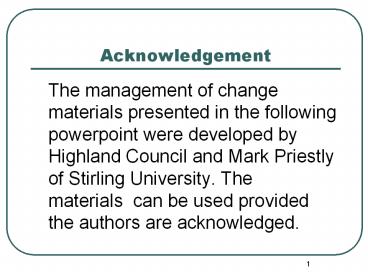Acknowledgement - PowerPoint PPT Presentation
1 / 12
Title:
Acknowledgement
Description:
Acknowledgement The management of change materials presented in the following powerpoint were developed by Highland Council and Mark Priestly of Stirling University. – PowerPoint PPT presentation
Number of Views:769
Avg rating:3.0/5.0
Title: Acknowledgement
1
Acknowledgement
- The management of change materials presented in
the following powerpoint were developed by
Highland Council and Mark Priestly of Stirling
University. The materials can be used provided
the authors are acknowledged.
2
Managing and sustaining education change
3
Innovation without change
- Teaching is a 'technology which appears
especially resilient to change' (Spillane, 1999) - Past records for curriculum initiatives show
extraordinarily modest levels of pedagogical
implementation (Swann and Brown, 1997) - So many innovations last no longer than warm
breath on a cold window (Cuban, 1998) - Hurricane winds sweep across the sea tossing up
twenty foot waves a fathom below the surface
turbulent waters swirl while on the ocean floor
there is unruffled calm (Cuban, 1984)
4
4 key principles
- Participation
- Dialogue
- Engagement
- Thinking
5
Activity one - PMI
- Do a PMI on the notion of introducing a
particular innovation to your school/dept. - Plus
- Minus
- Interesting
- Then consider
- To what extent does existing practice accommodate
the 4 principles? - Where it has been introduced, has it enhanced
these? - Choose a spokesperson be prepared to give
feedback
6
A matter of priorities?
- Needs of learners
- Research on learning
- Education for life
- Teaching to exams
- Overcrowded curriculum
- Accountability
- QA
- Lack of time / money / resources
- The grammar of schooling (Tyack and Cuban 1994)
7
The practicality ethic a different way of
looking at things (Doyle and Ponder 1977)
- Instrumental reasons
- Too hard
- Too much time
- Poor resources
- Costs
- Results
- Career
- Congruence with values
- Engaging and motivating kids
- Enabling critical thinking
- Enjoyable teaching
- Tackle instrumentality
- Costs become benefits
8
Promoting sustainable change
- Several dimensions
- Central impetus constructive and coherent
policy, good resourcing - Leadership support from EA and school managers
- Distributed leadership non-promoted
practitioners as leaders - Autonomy professional trust, a genuine shift in
power to those at the chalk face, school-based
decision-making.
9
Promoting sustainable change
- Collaboration space and time for generative
dialogue, peer observation of teaching, other
professionals - Professional enquiry systematic intervention
and recording of results, start small/think big - Research - as a cognitive resource, rather than
a dogma - Teacher learning professional development, peer
and management support, developing capacity - Time long time scale for reform, time for
professional dialogue
10
Impetus
Development cycle
Autonomy development action inquiry
Scaffolding
Evaluation
11
In short
- Building will and capacity to reform rather than
imposing it - Organic rather than mechanical view of reform
tend and grow from the inside, mixture of top
down and bottom up approaches - Acceptance that results may be surprising
12
Activity two paper carousel
- Discuss
- What are the barriers to change in your
school/dept? - What strategies and solutions are there to
encourage and sustain change in your school/dept? - Summarise conclusions and circulate them to other
groups. - Look at other groups conclusions
- How are they similar/different to yours?
- What can you take from them?































